#roy and silo and tango
Text
Favourite genre of feel-good stories:
Bird tries to incubate a rock and then the keepers replace the rock with an actual egg/hatchling and the bird raises the baby like their own 😭
#birds#murphy the bald eagle#murphy and 23-206#roy and silo the chinstrap penguins#roy and silo and tango
145 notes
·
View notes
Text
today's gay animal of the day is...

chinstrap penguins!
homosexuality is actually fairly common across multiple species of penguin! it was first documented as far back as 1911, and has since been corroborated by many studies. A pair of male chinstrap penguins named Roy and Silo became famous for successfully incubating another pair’s egg, resulting in a chick named Tango, which was popularized in a children’s book called "And Tango Makes Three."
#penguins#chinstrap penguin#and tango makes three#biology#gay science#queer science#gay#queer#lgbtqia#lgbtq#birds
48 notes
·
View notes
Text
Let's talk about gay penguins for the next day of pride month!
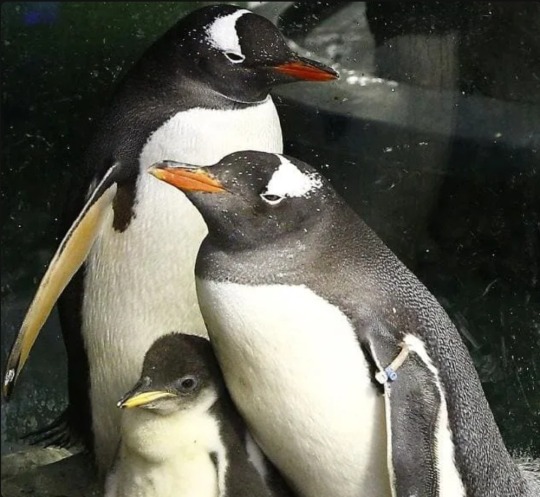
I think most people know at this point that penguins are known to be gay, and even lesbian! But what most people don't know is that they've been seen to engage in homosexual behavior since at least as early as 1911!
See a scientist, George Murray Levick, documented the behaviour in Adélie penguins at Cape Adare, but described it as "depraved". He decided it was too shocking for public release so he hid it. The only copies that were made available privately to researchers had the English text partly written in Greek letters, to prevent this knowledge becoming more widely known. The report was unearthed a century later, in June 2012 and was finally published.
(X)
Unfortunately that's not the last time gay penguins would cause an uproar.
There have been a lot of homosexual behavior seen in penguins in captivity, including Roy and Silo, two male chinstrap penguins in New York City's Central Park Zoo. They were noted by staff at the zoo in 1998 to be performing mating rituals, and one of them in 1999 attempted to hatch a rock as if it were an egg. Zoo keepers decided to give them an egg from a pair of penguins, which could not hatch it. Roy and Silo spent two and a half months raising the healthy young chick, a female named Tango. When she reached breeding age, Tango paired with another female penguin named Tanuzi!
(X)
Now for the "controversy".

And Tango Makes Three is a children's book published in 2005, telling the story of Roy and Silo. There was a lot of support, but there was even more backlash. Despite having ten awards and two nominations, it appeared on the American Library Association’s top ten banned books, banned in 2023, 2020, 2017, 2014, 2012, 2010, 2009, 2008, 2007, and firstly in 2006, just a year after it was published.
(X)
Alright, enough sad stuff, lets talk happy.
Here's the thing, penguins often lay more than one egg, though usually only one chick will survive. In captivity same sex penguins will adopt (or steal) extra eggs to incubate and raise the chicks! It's likely this happens in the wild, though it’s harder to say. Visibly, male and female penguins tend to only differ in size, and not by much. On top of that, they act very similar, particularly in terms of reproduction. Both males and females invest pretty equally in raising their chicks. That means it’s difficult to tell male and female penguins apart and even more difficult to identify any wild mating pairs as homosexual.
There have been many records of captive same sex penguins, and, there's even what could be considered a non-binary, or genderless, penguin.
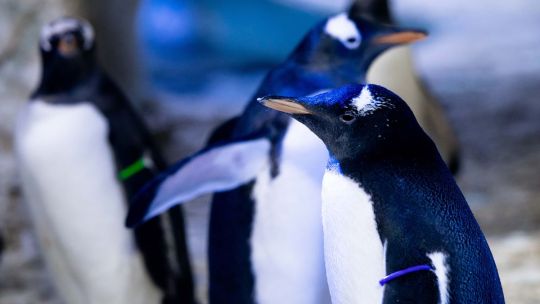
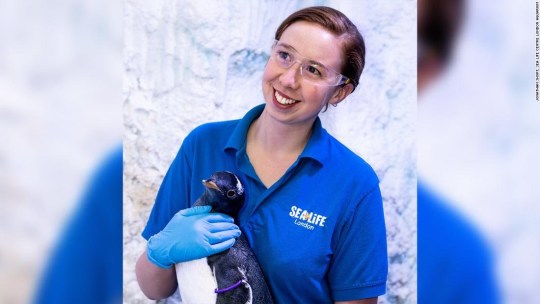
In 2019, mothers Rocky and Marama hatched a chick together at sea Life Aquarium in London. This chick caused further controversy after the aquarium announced that it would not be assigning the chick a gender. The chick is identified with a gender-neutral purple tag rather than the usual gendered name and color coded tag. Beyond that, the penguin’s life will be the same as any other penguin at the Aquarium. They say that Gender means nothing to penguins, so why have we continuously assigned it to them? The General Manager of the aquarium comments that the decision to raise a genderless penguin is following an increase in conversations around human gender neutrality.
(X)
#this one got long sorry yall😅#found out a lot more than id already known#animals#nature#critters#wild life#wildlife#animal facts#facts#birds#penguins#gay#homosexual#pride#pride month#lesbian#non-binary#lgbt
212 notes
·
View notes
Text
Judge Rules ‘And Tango Makes Three’ Case Can Proceed; Ruby Bridges Speaks Out
A federal judge has ruled that two authors and a student can pursue First Amendment claims against the Escambia County (FL) School Board over the removal of And Tango Makes Three from library shelves.
=-=-=-=
For anyone who's unfamiliar with And Tango Makes Three: It's a sweet picture book about the true story of how Central Park Zoo's gay chinstrap penguins Silo and Roy were given a baby penguin to raise.

There's absolutely nothing in the story that's inappropriate for children; I've read it to my own students before.
#librarylife#libraryland#library news#and tango makes three#children's books#banned books#kidlit#children's literature#school librarian#news article
38 notes
·
View notes
Text

💙Happy Fathers Day and Happy Pride to Roy & Silo! 💙
Roy & Silo was one of the first internationally recognized cases of a homosexual relationship between animals when zookeepers noticed Roy and Silo performing mating rituals and attempted to hatch a rock as if it were an egg.
This inspired the zookeepers to give them an egg from a pair of penguins, which failed to hatch, resulting in the pair raising a chick they named Tango.
And fun fact Tango came out as a lesbian.
Homosexuality is not a sin but something natural 🏳️🌈
#schibidraws#fanart#traditional artist#traditional art#art#penguin drawing#penguin#chinstrap penguin#roy and silo#happy father's day#happy pride 🌈#pride#pride month#lgbtqia#lgbt pride#homosexual#gay#gay pride#hfd#fathers day
21 notes
·
View notes
Note
gay penguins
Animal of the day: Gay Penguins!
Penguins are one of many animal species to experience homosexuality. It is actually advantageous, because eggs or chicks that get abandoned or orphaned are often adopted by these homosexual couples. Here are some examples:

Roy and Silo from New York City's Central Park Zoo! These two males formed a relationship and raised a chick together named Tango. They became quite famous, and even had a book written about them!

These two males stole a nest from a lesbian penguin couple at a Dutch zoo!

This chick was hatched by Elmer and Lima, a same-sex couple from Rosamond Gifford Zoo in Syracuse, New York!
Nature is very gay, despite what conservatives would have you believe. Same sex couples are natural and important.
:)
49 notes
·
View notes
Text
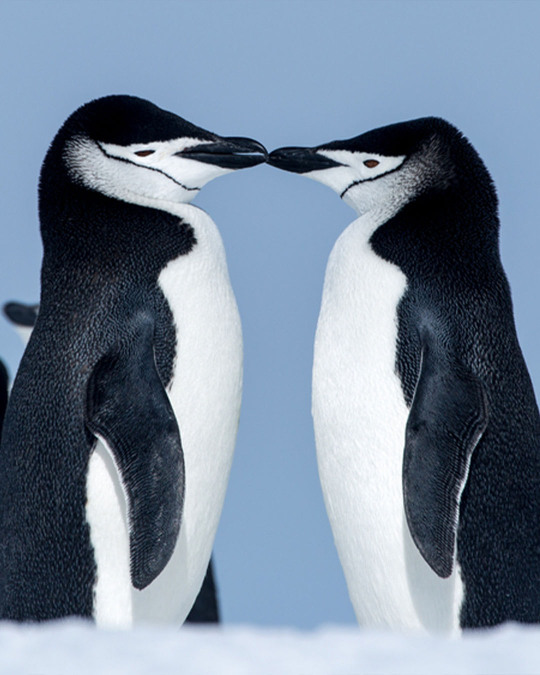
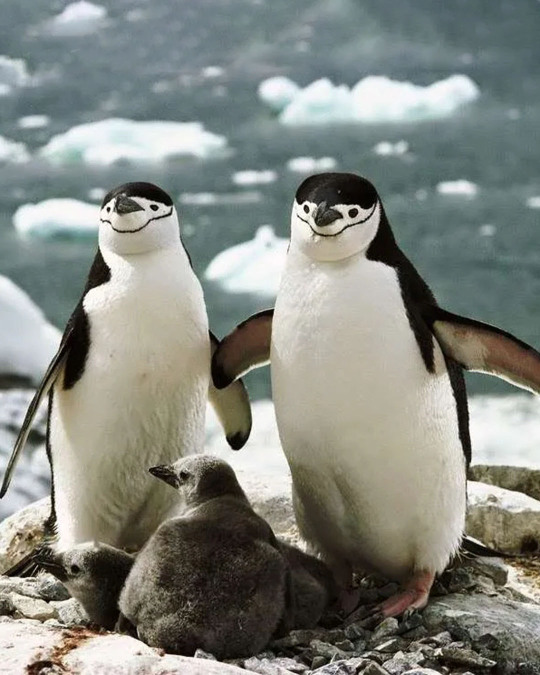
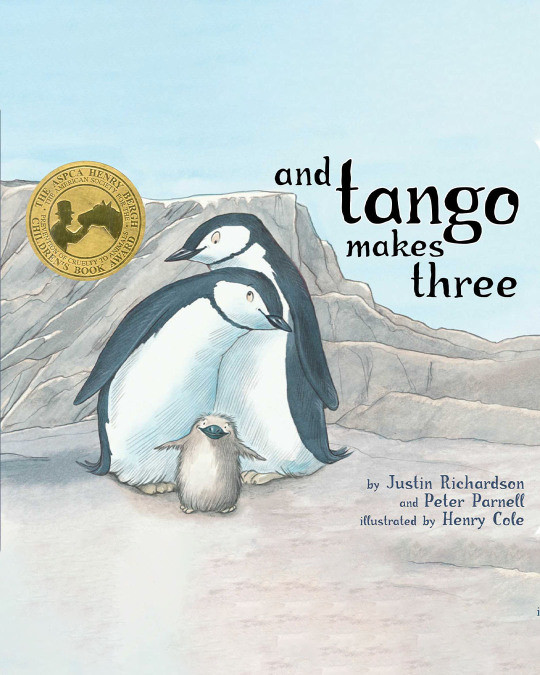
🐧🎉 Happy National Penguin Day! 🎉🐧
Today, we celebrate the charming and adorable Silo the Penguin, a true feathered friend who has captured our hearts! ❤️🐧
Roy and Silo (slide 1) rocketed to fame as the "gay penguins" of New York's Central Park Zoo. Zookeepers first witnessed them exhibiting mating behaviors in 1998. In 1999, the pair attempted to hatch a rock, which inspired zookeepers to give them an egg that another couple could not hatch. 🪨
Roy and Silo successfully incubated the egg and hatched a chick that the zoo named Tango (slide 2). Their story inspired the children's book "And Tango Makes Three" (slide 3). According to the American Library Association, "And Tango Makes" Three is one of the most banned children's books in the United States because it depicts a same-sex relationship. 🐣
💔 This, however, is not where the story ends.
In May 2004, the couple was kicked out of their nest by a more aggressive pair of penguins, and Roy and Silo started to drift apart. 👀 Silo ended up bonding with another penguin named Scrappy, a female penguin brought to the zoo in 2002. 🫶
#bis#lgbt#queer#bisexuality#bi#lgbtq#lgbtqia#bi pride#bi visibility#bivisibility#representationmatters#bisexual#birbs#zoo animals#childrens books#lgbt books#queer community#queer books#queer story#penguin lover#lgbtq community#lgbt pride
15 notes
·
View notes
Text
7 Banned Books to Read this Banned Book Week
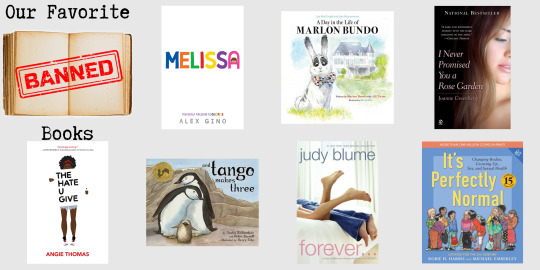
With book bans sweeping the United States, the Duck Prints Press rec list contributors wanted to take a moment to shout out our favorite books that get banned most frequently. Being us, they are, unsurprisingly, mostly queer.
Learn more about Banned Books Week.
-
Melissa by Alex Gino
When people look at George, they think they see a boy. But she knows she’s not a boy. She knows she’s a girl. George thinks she’ll have to keep this a secret forever. Then her teacher announces that their class play is going to be Charlotte’s Web. George really, really, REALLY wants to play Charlotte. But the teacher says she can’t even try out for the part . . . because she’s a boy. With the help of her best friend, Kelly, George comes up with a plan. Not just so she can be Charlotte—but so everyone can know who she is, once and for all.
-
A Day in the Life of Marlon Bundo, written by Jill Twiss and illustrated by E. G. Keller
Meet Marlon Bundo, a lonely bunny who lives with his Grampa, Mike Pence – the Vice President of the United States. But on this Very Special Day, Marlon’s life is about to change forever…
With its message of tolerance and advocacy, this charming children’s book explores issues of same sex marriage and democracy. Sweet, funny, and beautifully illustrated, this book is dedicated to every bunny who has ever felt different.
-
I Never Promised You a Rose Garden by Joanne Greenberg
I Never Promised You a Rose Garden is the story of a sixteen-year-old who retreats from reality into the bondage of a lushly imagined but threatening kingdom, and her slow and painful journey back to sanity.
Chronicles the three-year battle of a mentally ill, but perceptive, teenage girl against a world of her own creation, emphasizing her relationship with the doctor who gave her the ammunition of self-understanding with which to help herself.
-
The Hate U Give by Angie Thomas
Sixteen-year-old Starr Carter moves between two worlds: the poor neighborhood where she lives and the fancy suburban prep school she attends. The uneasy balance between these worlds is shattered when Starr witnesses the fatal shooting of her childhood best friend Khalil at the hands of a police officer. Khalil was unarmed.
Soon afterward, his death is a national headline. Some are calling him a thug, maybe even a drug dealer and a gangbanger. Protesters are taking to the streets in Khalil’s name. Some cops and the local drug lord try to intimidate Starr and her family. What everyone wants to know is: what really went down that night? And the only person alive who can answer that is Starr.
But what Starr does—or does not—say could upend her community. It could also endanger her life.
-
And Tango Makes Three, written by Justin Richardson and Peter Parnell, illustrated by Henry Cole
At the penguin house at the Central Park Zoo, two penguins named Roy and Silo were a little bit different from the others. But their desire for a family was the same. And with the help of a kindly zookeeper, Roy and Silo get the chance to welcome a baby penguin of their very own.
-
Forever… by Judy Blume
Katherine and Michael meet at a New Year’s Eve party. They’re attracted to each other, they grow to love each other. And once they’ve decided their love is forever, they make love.
It’s the beginning of an intense and exclusive relationship, with a future all planned. Until Katherine’s parents insist that she and Michael put their love to the test with a summer apart…
-
It’s Perfectly Normal: Changing Bodies, Growing Up, Sex, and Sexual Health, written by Robie H. Harris and illustrated by Michael Emberley
When young people have questions about sex, real answers can be hard to find. Providing accurate, unbiased answers to nearly every imaginable question, from conception and puberty to birth control and AIDS, It’s Perfectly Normal offers young people the information they need—now more than ever—to make responsible decisions and to stay healthy.
-
What are YOU reading this Banned Book Week?
15 notes
·
View notes
Text
Fuck book banning 2024
30 Banned Books You Should Read (from Bored Teachers, linked below).
From picture books to classic literature, here we go. . . .
1. Where the Wild Things Are
By Maurice Sendak
Where the Wild Things Are is a childhood classic and Caldecott-winning picture book about a young boy named Max who sails to a far off land and becomes king of the wild things. While he is sent to his room for wreaking havoc in his wolf costume, Max returns from the land of his imagination to find a hot supper waiting for him.
Why it was banned: Supernatural elements and dark, disturbing imagery; psychologically damaging because a boy is sent to bed without supper.
2. In the Night Kitchen
By Maurice Sendak
A boy named Mickey is asleep in his bed when he’s suddenly transported into the Night Kitchen, a land where bakers obsessively bake the morning’s cake. At one point, Mickey falls into the batter. He loses his pajamas along the way and is depicted nude in a few spreads, until he escapes the kitchen in a plane made of bread and wakes up in his own bed.
Why it was banned: Nudity
3. Strega Nona
By Tomie DePaolo
Strega Nona leaves Big Anthony alone with her magic pasta pot, and soon Anthony unleashes a magic he cannot control. Luckily, Strega Nona – literally, Grandmother Witch – returns to sort out Big Anthony’s mess.
Why it was banned: Positive depictions of witchcraft
4. And Tango Makes Three
Written by Justin Richardson and Peter Parnell and illustrated by Henry Cole
Based on a true story, And Tango Makes Three describes two male penguins named Roy and Silo, who are a bonded pair. A zookeeper gives them a motherless egg, and together the two penguins hatch and raise a chick named Tango.
Why it was banned: Positive depictions of same-sex family
5. Where the Sidewalk Ends
By Shel Silverstein
Shel Silverstein’s irreverent poetry and his signature artwork are practically modern classics. They are funny and an easy introduction to poetry for elementary school students – even my high school students still read these poems!
Why it was banned: Rebellious poems that undermine parental authority
6. Heather Has Two Mommies
Written by Leslea Newman and illustrated by Laura Cornell
Heather has two mommies, but she learns that families come in all shapes and sizes when she and her classmates draw pictures of their families and no two are the same.
Why it was banned: Same-sex parenting and homosexuality
7. I Am Jazz
Written by Jessica Herthel and Jazz Jennings and illustrated by Shelagh McNicholas
Jazz Jennings knew from a young age that she had a “girl’s brain in a boy’s body.” I Am Jazz chronicles Jazz’s story as a transgender individual.
Why it was banned: Depictions of a transgender child
8. The Family Book
By Todd Parr
The Family Book is a celebration of the different varieties that families come in – two parents, one parent, same-sex parents, grandparents, pets, and more. This book celebrates the differences that make us who we are.
Why it was banned: Depiction of same-sex families
9. Captain Underpants
By Dav Pilkey
Captain Underpants is a bestselling series of graphic novels for children about a superhero named Captain Underpants and his creators George and Harold.
Why it was banned: Offensive language, partial nudity, glorifying misbehavior by children
10. Walter the Farting Dog
Written by William Kotzwinkle and Glenn Murray and illustrated by Audrey Colman
Billy and Betty love their dog Walter in spite of his odorous problem, but Dad says they have to get rid of him. One night, burglars break in and Walter gets to save the day!
Why it was banned: Excessive use of the word ‘fart’
11. The Hate U Give
By Angie Thomas
Sixteen-year-old Starr Carter is the sole witness of the police shooting that kills her friend Khalil. She finds herself caught in a firestorm as Khalil’s story blows up into a national debate. The Hate U Give – THUG for short – has won just about every award a book can win.
Why it was banned: Inappropriate language and sexual situations
12. A Wrinkle in Time
By Madeleine L’Engle
In this book that won the Newbery award, Meg, her brother Charles Wallace, and her friend Calvin travel across the universe in search of her missing father, an astrophysicist. The book is a coming of age tale that is truly about a battle of good versus evil.
Why it was banned: Being too religious, not being religious enough, depictions of witchcraft and the supernatural
13. Perks of Being a Wallflower
By Stephen Chobsky
Charlie, the wallflower in the title, stars in this coming-of-age story as he tries to navigate the sometimes-tumultuous waters of adolescence. The book is raw and real.
Why it was banned: Language, homosexuality, scenes that sexually explicit, and depictions of drug and alcohol abuse
14. Looking for Alaska
By John Green
Protagonist Miles Halter leaves for boarding school and meets Alaska Young, a bold, tortured girl like he’s never met before, whose fate at the end of the story impacts Miles forever.
Why it was banned: Offensive language and sexually explicit descriptions
15. The Outsiders
By S.E. Hinton
The Outsiders is one of the iconic classic banned books. It tells the story of Ponyboy and his fellow “Greaser” brothers Darry and Sodapop. The greasers are at war with a rival gang called the “Socs,” and one day things go too far.
Why it was banned: Offensive language, depictions of drug use, gang violence
16. The Giver
By Lois Lowry
The Giver is the first in a series of often four banned books called The Giver Quartet. It depicts a dystopian world of conformity in which only one man retains all of society’s memories and emotions. Twelve-year-old Jonas is selected to become the next Receiver of Memory, and with this new assignment comes a world of realization that Jonas is hardly prepared to receive.
Why it was banned: Depictions of infanticide and euthanasia in a dystopian society
17. Speak
By Laurie Halse Anderson
Melinda starts her freshman year completely ostracized after she called the cops on a party that got out of hand during the summer. She shuts down, only finding a small respite in art class. Eventually, the reader learns that something happened at the party that changed the trajectory of Melinda’s life. Once her secret is out, she recovers her voice and learns to always speak up for herself.
Why it was banned: Profanity, sexually explicit content and depictions of drinking
18. Forever
By Judy Blume
Forever is a book about a committed high school couple deciding to have sex. Specifically, the teenager girl protagonist, Katherine, decides to lose her virginity to Michael. Eventually, their relationship fizzles, leaving Katherine contemplating the nature of love.
Why it was banned: Descriptions of sexual intercourse and discussions of birth control put this on the list of frequently banned books.
19. The Golden Compass
By Philip Pullman
This is the first in a fantasy trilogy for teens that is set in a world where humans each have animal familiars known as daemons. Protagonist Lyra, an orphan girl, is concerned about the mysterious disappearances of children in her town. When she learns the disappearances may be connected somehow to her scholarly uncle and a strange phenomenon known as Dust, she sets out to solve the mystery.
Why it was banned: Promotion of atheism and denigration of Christianity
20. Cut
By Patricia McCormick
This short book is about Callie, a girl who cuts herself and is sent to a treatment facility, where she falls mute and refuses to participate in rehabilitation. It’s an intense and powerful read.
Why it was banned: Depictions of self-mutilation
21. The Glass Castle
By Jeanette Walls
The Glass Castle spent seven years on the bestseller list, which speaks to the power of this memoir. Walls writes about her upbringing in the hands of a brilliant father who turned destructive when drinking and a mother who didn’t want the responsibility of motherhood.
Why it was banned: Sexual situations, depictions of abuse and alcoholism
22. The Kite Runner
By Khaled Hosseini
A novel of searing power, The Kite Runner follows Amir, a man who was raised in Afghanistan and becomes a successful writer in the United States. The death of his childhood friend at the hands of the Taliban prompts Amir to return to the land of his childhood, where he must face the memories that haunt him.
Why it was banned: Sexual violence, religious viewpoint, offensive language
23. To Kill A Mockingbird
By Harper Lee
A classic taught in many schools today, To Kill A Mockingbird is a coming of age story set against a vicious trial in which a white woman falsely accuses a black man of rape in the deep South.
Why it was banned: Profanity, racial slurs, discussion of rape
24. The Catcher in the Rye
By J.D. Salinger
Holden Caulfield is, at sixteen, jaded by society, by adults, and by the world around him. He explores the bowels of New York City and its characters in a story that ultimately examines the loss of innocence required to grow up in this world.
Why it was banned: Profanity and sexual scenes
25. Beloved
By Toni Morrison
Beloved is an unflinching and important read that explores the atrocities of slavery from the perspective of Sethe, a woman who was once a slave and is now free, except for the memories of the hideous things she was forced to experience.
Why it was banned: Racial and sexual violence, infanticide, language
26. Slaughterhouse Five
By Kurt Vonnegut
Billy Pilgrim, a World War II prisoner becomes “unstuck” in time and relives scenes from his life over and over again. The theme Vonnegut develops centers around the depravity of war.
Why it was banned: Sexual situations, profane language, content deemed immoral and anti-Christian
27. Animal Farm
By George Orwell
Animal Farm is an allegory about the dangers of totalitarianism. In it, a cast of farm animals set out to great a utopia, but their dream becomes a nightmare when the subtle temptation of power becomes too much and tyranny reigns supreme.
Why it was banned: Political commentary that could encourage unrest
28. I Know Why the Caged Bird Sings
By Maya Angelou
Angelou writes a memoir about her indomitable spirit, from the loneliness she feels when her mother sends her to live with her grandmother to the experience of being raped as a child. She writes about how she found herself within the pages of books written by great authors, which led her to become one of America’s greatest poets.
Why it was banned: Offensive language and portrayals of child rape, racism, and violence
29. Of Mice and Men
By John Steinbeck
George travels with Lennie, a man with a heart of gold and the mind of a child. They look for work in depression era California, while dreaming of their own chance at the American Dream.
Why it was banned: Profanity, racial slurs, violence, depressing themes
30. The Handmaid’s Tale
By Margaret Atwood
This dystopian novel takes place in a post-democracy world ruled by hyper-religious totalitarian regime that has enslaves women and forces them to bear children.
Why it was banned: Sexual overtones
4 notes
·
View notes
Text
AI Autopilot: The Future of Efficient Lead Nurturing in SaaS

Lead nurturing in the SaaS world is often a tedious tango between personalization and automation. Humans excel at crafting nuanced messaging, but struggle with scaling efforts. Automation tools, conversely, handle volume with ease, but often deliver bland, robotic interactions. This dichotomy has long plagued SaaS digital marketing agencies, forcing them to make a Faustian bargain: personalized touch at the expense of efficiency, or robotic outreach for broader reach.
But what if a third option existed? One that seamlessly blends the emotional intelligence of human nurturing with the tireless execution of AI? Enter the AI Autopilot: a revolutionary approach to lead nurturing that leverages the power of artificial intelligence to personalize interactions at scale, maximizing efficiency without sacrificing the human touch.
AI Autopilot: How it Works
Imagine a system that learns the nuances of your ideal customer profile, their pain points, and their preferred communication channels. This AI-powered engine then orchestrates a multi-stage nurturing journey, dynamically tailoring content, timing, and tone to each individual lead. No two interactions are the same, yet each one resonates deeply with the recipient, nurturing them towards conversion with laser-like precision.
Here's how it unfolds:
1. AI-Powered Segmentation:
Forget broad demographic buckets. The AI Autopilot utilizes advanced machine learning algorithms to segment your leads based on a myriad of data points, from website behavior and engagement metrics to social media activity and purchase history. This hyper-granular segmentation ensures each lead receives content and offers relevant to their specific needs and interests.
2. Dynamic Content Personalization:
Gone are the days of robotic, one-size-fits-all email blasts. The AI Autopilot analyzes your content library and dynamically assembles personalized messages for each lead, drawing from relevant blog posts, case studies, and webinars based on their individual interests and pain points. Imagine a lead receiving an email with a video testimonial from a customer facing a similar challenge, or a blog post directly addressing their specific industry concern. This laser-focused personalization fosters deeper engagement and builds trust.
3. Adaptive Nurturing Cadences:
No more rigid email drip campaigns. The AI Autopilot monitors lead behavior in real-time, adjusting the pace and cadence of nurturing interactions based on their engagement. A highly engaged lead receives a rapid-fire sequence of content and offers, while a less engaged one is gently nudged back into the funnel with spaced-out, value-driven messages. This adaptive approach keeps leads on the optimal path to conversion, minimizing churn and maximizing ROI.
4. Conversational Marketing Integration:
The AI Autopilot doesn't exist in a silo. It seamlessly integrates with your existing marketing automation platform and conversational marketing tools, like chatbots and live chat. This allows for real-time, personalized interactions at crucial touchpoints in the buyer's journey. Imagine a lead receiving a targeted chat message offering additional information just as they land on a pricing page, or a chatbot proactively addressing their concerns as they navigate your help center.
The Human in the Machine:
While AI takes the wheel, the human element remains crucial. The AI Autopilot empowers SaaS digital marketing agencies by augmenting their capabilities, not replacing them. Human expertise is still needed to define ideal customer profiles, curate high-quality content, and set the strategic direction for nurturing campaigns. The AI simply amplifies human efforts, delivering a level of personalization and efficiency never before possible.
The Future of Lead Nurturing:
The AI Autopilot is not just a fad, but a glimpse into the future of SaaS marketing. As AI technology continues to evolve, expect even more sophisticated capabilities, like sentiment analysis and predictive lead scoring, to further refine the nurturing process. Imagine an AI that can anticipate a lead's churn risk and intervene with targeted incentives, or one that can personalize messaging based on a lead's emotional state at the moment of interaction.
The possibilities are endless, and the potential for increased conversion rates and customer lifetime value is undeniable. SaaS digital marketing agencies that embrace the AI Autopilot will be the ones who thrive in the ever-evolving landscape of lead nurturing, leaving their competitors in the dust.
So, are you ready to relinquish the manual controls and let AI take the wheel of your lead nurturing efforts? Buckle up, the future of efficient conversion is here.
—----------------------------------------------------------------------------------------------------------------------------
0 notes
Text
🌈✨📚Childrens Books Banned For Inclusivity📚✨🌈
And Tango Makes Three
By: Justin Richardson, Peter Parnell, and Henry Cole

"At the penguin house at the Central Park Zoo, two penguins named Roy and Silo were a little bit different from the others. But their desire for a family was the same. And with the help of a kindly zookeeper, Roy and Silo got the chance to welcome a baby penguin of their very own."
~Alice 🌌
0 notes
Text
By Elizabeth A. Harris and Alexandra Alter
A group of students and the authors of a children’s book about a penguin family with two fathers sued a Florida school district and the state’s board of education on Tuesday, saying that restricting access to the book in school libraries was unconstitutional.
The suit argues that the book was targeted on ideological grounds, as a result of new legislation that has led to a spike in book removals. The state law, known by its opponents as “Don’t Say Gay,” bars instruction on gender identity and sexual orientation. In an attempt to follow the statute, the school district, Lake County, restricted access to 40 titles, the vast majority of them books that deal with L.G.B.T.Q. issues and themes.
The lawsuit by the authors of the picture book, “And Tango Makes Three,” seeks to make it available again and to have the law found unconstitutional.
Restrictions on books have become widespread in some parts of the country, particularly in places like Florida, which have passed statewide regulations outlining what constitutes appropriate reading material for children. Books that get removed from libraries are often described as inappropriate or pornographic, but in practice, many deal with themes of race or include L.G.B.T.Q. characters, according to free speech organizations and library groups.
“Our book has been banned because Tango has two dads,” said Justin Richardson, who wrote the book with his husband, Peter Parnell.
The book is based on the true story of a pair of male penguins at the Central Park Zoo, Roy and Silo, who incubated and hatched a baby chick. Zookeepers named the chick Tango. The book’s authors — Parnell, a writer, and Richardson, a psychiatrist — wrote the story after reading about the real-life Roy and Silo in a New York Times article, which described them as two chinstrap penguins who were “completely devoted to each other.”
The picture book, aimed at 4- to 8-year-olds, has won multiple awards. It has also been banned or restricted in many districts around the United States after parents and residents objected to the book’s depiction of a family with same-sex parents.
The complaint, which was filed in the U.S. District Court for the Middle District of Florida, said the Lake County school district had “cited no legitimate pedagogical reason for its decision.” The lawsuit went on to argue that “the book is factually accurate, non-vulgar and non-obscene; ‘Tango’ had previously stood on school library shelves; and ‘Tango’ was restricted for illegitimate, narrowly partisan and political reasons.”
Sherri Owens, a spokeswoman for the Lake County school district, said that the district could not comment on pending litigation. “We removed access to ‘And Tango Makes Three’ for our kindergarten through third-grade students in alignment with Florida House Bill 1557, which at the time prohibited classroom instruction on sexual orientation or gender identity for those grade levels,” Ms. Owens said in an email.
Representatives from the state board of education did not immediately respond to a request for comment.
Richardson said the book had been routinely challenged since it was published in 2005. But as far as he knows, he said, it was never permanently restricted in a public school library until December, when Lake County limited access to the book to comply with the state law.
The legislation originally applied to students in kindergarten through third grade, but a new law extending the restrictions from prekindergarten through eighth grade passed last month. The complaint describes the law as “vague and overbroad,” and says its penalties are overly stringent: Educators who knowingly violate it could lose their teaching license.
The legislation, called the Parental Rights in Education law, was signed last year by Gov. Ron DeSantis, who described it as a tool to help parents stay aware of what their children learn in the classroom.
“Parents have every right to be informed about services offered to their child at school,” he said in a statement when he signed the bill, “and should be protected from schools using classroom instruction to sexualize their kids as young as 5 years old.”
In an interview, Richardson said that “Tango” is no less age appropriate than the classic children’s book “Make Way for Ducklings,” by Robert McCloskey, in which a female duck and a male duck look for a nice spot in Boston to raise their brood.
“Both show water birds becoming parents and caring for their young,” Richardson said. “There is no sexual implication or language in either — but only one has been banned.”
The suit was also brought on behalf of six students in Lake County, including a rising first grader who attends public school in the district and who, according to the complaint, wants to read “Tango” because of his fascination with animals.
The suit claims that students’ First Amendment right to receive information has been violated, that the authors’ reputations have been damaged by the suggestion that the book “contains sexual or age-inappropriate material that deserves to be banned” and that the authors’ free speech rights have been infringed upon.
“Whatever one believes about the value of respecting two-mom or two-dad families,” Richardson said, “there is no substance to any claim that it’s harmful or inappropriate at any age for children to learn that we exist.”
In recent years, efforts to remove books have surged across the United States. The movement has been amplified by a growing network of conservative groups seeking to remove books that are often about race, gender and sexual orientation, and by new statewide laws that in many cases make it easier to remove books from schools and libraries.
The lawsuit in Florida is the latest action from literary groups, authors and parents who are pushing back, seeking to overturn book bans through the courts and with legislation.
Illinois last week became the first state in the country to attempt to ban book banning, passing a law that directs public libraries to adopt policies that prohibit them from removing books because of “partisan or doctrinal disapproval.”
Earlier this month, a group of librarians, bookstores and publishers sued to prevent a new law aimed at libraries and booksellers from taking effect in Arkansas. The suit argued that the law, which requires any material that might be “harmful” to minors to be shelved in a separate, “adults only” area, is unconstitutional and could send booksellers and librarians to prison.
The Association of American Publishers and several big publishing companies recently filed a brief in a lawsuit in Llano, Texas, in support of a group of residents who have sued the county and library officials over book removals, which included books about L.G.B.T.Q. issues and race, among them “Caste,” by Isabel Wilkerson.
And last month in Florida, the free-speech organization PEN America and the country’s largest book publisher, Penguin Random House, sued the Escambia County school district and school board over the removal of books that were written by nonwhite and L.G.B.T.Q. authors and addressed themes of race, racism, gender and sexuality.
Florida has become an epicenter in the fight over what constitutes appropriate reading material for students. After the state passed a law that requires trained media specialists to evaluate each book in the school to ensure it is age-appropriate and free of “pornographic” content, some schools emptied or covered up their library shelves while they scrambled to vet all the titles.
In the lawsuit over “Tango,” plaintiffs aim to restore access to the book and are also seeking “a permanent injunction prohibiting the State Defendants from enforcing” the new legislation.
“It permits, and frankly encourages, viewpoint discrimination, and that’s exactly what happened in its application,” Faith E. Gay, a lawyer with Selendy Gay Elsberg, the law firm representing the plaintiffs, said of the legislation. “Nothing could be more overreaching than to sweep up a book like ‘Tango’.”
0 notes
Text
By Elizabeth A. Harris and Alexandra Alter
A group of students and the authors of a children’s book about a penguin family with two fathers sued a Florida school district and the state’s board of education on Tuesday, saying that restricting access to the book in school libraries was unconstitutional.
The suit argues that the book was targeted on ideological grounds, as a result of new legislation that has led to a spike in book removals. The state law, known by its opponents as “Don’t Say Gay,” bars instruction on gender identity and sexual orientation. In an attempt to follow the statute, the school district, Lake County, restricted access to 40 titles, the vast majority of them books that deal with L.G.B.T.Q. issues and themes.
The lawsuit by the authors of the picture book, “And Tango Makes Three,” seeks to make it available again and to have the law found unconstitutional.
Restrictions on books have become widespread in some parts of the country, particularly in places like Florida, which have passed statewide regulations outlining what constitutes appropriate reading material for children. Books that get removed from libraries are often described as inappropriate or pornographic, but in practice, many deal with themes of race or include L.G.B.T.Q. characters, according to free speech organizations and library groups.
“Our book has been banned because Tango has two dads,” said Justin Richardson, who wrote the book with his husband, Peter Parnell.
The book is based on the true story of a pair of male penguins at the Central Park Zoo, Roy and Silo, who incubated and hatched a baby chick. Zookeepers named the chick Tango. The book’s authors — Parnell, a writer, and Richardson, a psychiatrist — wrote the story after reading about the real-life Roy and Silo in a New York Times article, which described them as two chinstrap penguins who were “completely devoted to each other.”
The picture book, aimed at 4- to 8-year-olds, has won multiple awards. It has also been banned or restricted in many districts around the United States after parents and residents objected to the book’s depiction of a family with same-sex parents.
The complaint, which was filed in the U.S. District Court for the Middle District of Florida, said the Lake County school district had “cited no legitimate pedagogical reason for its decision.” The lawsuit went on to argue that “the book is factually accurate, non-vulgar and non-obscene; ‘Tango’ had previously stood on school library shelves; and ‘Tango’ was restricted for illegitimate, narrowly partisan and political reasons.”
Sherri Owens, a spokeswoman for the Lake County school district, said that the district could not comment on pending litigation. “We removed access to ‘And Tango Makes Three’ for our kindergarten through third-grade students in alignment with Florida House Bill 1557, which at the time prohibited classroom instruction on sexual orientation or gender identity for those grade levels,” Ms. Owens said in an email.
Representatives from the state board of education did not immediately respond to a request for comment.
Richardson said the book had been routinely challenged since it was published in 2005. But as far as he knows, he said, it was never permanently restricted in a public school library until December, when Lake County limited access to the book to comply with the state law.
The legislation originally applied to students in kindergarten through third grade, but a new law extending the restrictions from prekindergarten through eighth grade passed last month. The complaint describes the law as “vague and overbroad,” and says its penalties are overly stringent: Educators who knowingly violate it could lose their teaching license.
The legislation, called the Parental Rights in Education law, was signed last year by Gov. Ron DeSantis, who described it as a tool to help parents stay aware of what their children learn in the classroom.
“Parents have every right to be informed about services offered to their child at school,” he said in a statement when he signed the bill, “and should be protected from schools using classroom instruction to sexualize their kids as young as 5 years old.”
In an interview, Richardson said that “Tango” is no less age appropriate than the classic children’s book “Make Way for Ducklings,” by Robert McCloskey, in which a female duck and a male duck look for a nice spot in Boston to raise their brood.
“Both show water birds becoming parents and caring for their young,” Richardson said. “There is no sexual implication or language in either — but only one has been banned.”
The suit was also brought on behalf of six students in Lake County, including a rising first grader who attends public school in the district and who, according to the complaint, wants to read “Tango” because of his fascination with animals.
The suit claims that students’ First Amendment right to receive information has been violated, that the authors’ reputations have been damaged by the suggestion that the book “contains sexual or age-inappropriate material that deserves to be banned” and that the authors’ free speech rights have been infringed upon.
“Whatever one believes about the value of respecting two-mom or two-dad families,” Richardson said, “there is no substance to any claim that it’s harmful or inappropriate at any age for children to learn that we exist.”
In recent years, efforts to remove books have surged across the United States. The movement has been amplified by a growing network of conservative groups seeking to remove books that are often about race, gender and sexual orientation, and by new statewide laws that in many cases make it easier to remove books from schools and libraries.
The lawsuit in Florida is the latest action from literary groups, authors and parents who are pushing back, seeking to overturn book bans through the courts and with legislation.
Illinois last week became the first state in the country to attempt to ban book banning, passing a law that directs public libraries to adopt policies that prohibit them from removing books because of “partisan or doctrinal disapproval.”
Earlier this month, a group of librarians, bookstores and publishers sued to prevent a new law aimed at libraries and booksellers from taking effect in Arkansas. The suit argued that the law, which requires any material that might be “harmful” to minors to be shelved in a separate, “adults only” area, is unconstitutional and could send booksellers and librarians to prison.
The Association of American Publishers and several big publishing companies recently filed a brief in a lawsuit in Llano, Texas, in support of a group of residents who have sued the county and library officials over book removals, which included books about L.G.B.T.Q. issues and race, among them “Caste,” by Isabel Wilkerson.
And last month in Florida, the free-speech organization PEN America and the country’s largest book publisher, Penguin Random House, sued the Escambia County school district and school board over the removal of books that were written by nonwhite and L.G.B.T.Q. authors and addressed themes of race, racism, gender and sexuality.
Florida has become an epicenter in the fight over what constitutes appropriate reading material for students. After the state passed a law that requires trained media specialists to evaluate each book in the school to ensure it is age-appropriate and free of “pornographic” content, some schools emptied or covered up their library shelves while they scrambled to vet all the titles.
In the lawsuit over “Tango,” plaintiffs aim to restore access to the book and are also seeking “a permanent injunction prohibiting the State Defendants from enforcing” the new legislation.
“It permits, and frankly encourages, viewpoint discrimination, and that’s exactly what happened in its application,” Faith E. Gay, a lawyer with Selendy Gay Elsberg, the law firm representing the plaintiffs, said of the legislation. “Nothing could be more overreaching than to sweep up a book like ‘Tango’.”
0 notes
Note
For the ship ask game, the gay penguins,
3 &4
3) who has trouble sleeping alone
roy because he was sad when he couldn't find silo :(
4) who swears more
they don't sweat much because they want to set an example for tango, but i'm getting silo vibes
#fyi i didn't do this with a straight face#roy the penguin#silo the penguin#roy and silo#tango the penguin#ask#ask game#asks#anon#anonymous
5 notes
·
View notes
Text
Adventures in Librarian-ing
This week I read And Tango Makes Three (a picture book about Central Park Zoo's gay penguins that raised an egg) to the Grade 1s and a class of Grade 3s.
In one class, when I got to the part where the zookeeper decides that Roy and Silo must be in love

one of the kids gave a delighted surprised laugh and went "Wait, are they gay? Are these gay penguins?"
"Yup!" I replied, "And they're real penguins too. This is a real story."
Cue the hubbub of kids chattering at the discovery that gay penguins are a thing.
"Gay penguins!" they marveled over and over.
One of the kids started getting visibly upset, "Guys, stop it! That's a bad word! Stop saying the G-word!"
"It's not a bad word," their classmates assured them, perplexed.
"Anyone can be gay," a classmate explained, clearly trying to be helpful.
#gay penguins#libraryland#librarylife#libraries#school librarian#school libraries#the real life of me#elementary school#canada#silo and roy#penguins#children's literature#storytime#story time#picture books#gay representation#lgbtq positivity#with a dash of homophobia#homophobia#the kids are (mostly) alright#birds#nature is gay#adventures in librarian ing
224 notes
·
View notes
Note
Hi! Thought on the gay penguin couple, Roy and silo who has a lesbian daughter called tango (can't remember her gfs name) they also have a cute book aswell
Hey! I have no idea what you’re talking about but that sounds amazing dude! :D
7 notes
·
View notes